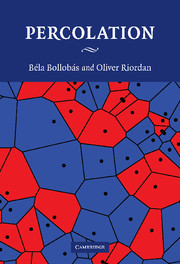Book contents
- Frontmatter
- Contents
- Preface
- 1 Basic concepts and results
- 2 Probabilistic tools
- 3 Bond percolation on ℤ2 – the Harris–Kesten Theorem
- 4 Exponential decay and critical probabilities – theorems of Menshikov and Aizenman & Barsky
- 5 Uniqueness of the infinite open cluster and critical probabilities
- 6 Estimating critical probabilities
- 7 Conformal invariance – Smirnov's Theorem
- 8 Continuum percolation
- Bibliography
- Index
- List of notation
4 - Exponential decay and critical probabilities – theorems of Menshikov and Aizenman & Barsky
Published online by Cambridge University Press: 05 June 2012
- Frontmatter
- Contents
- Preface
- 1 Basic concepts and results
- 2 Probabilistic tools
- 3 Bond percolation on ℤ2 – the Harris–Kesten Theorem
- 4 Exponential decay and critical probabilities – theorems of Menshikov and Aizenman & Barsky
- 5 Uniqueness of the infinite open cluster and critical probabilities
- 6 Estimating critical probabilities
- 7 Conformal invariance – Smirnov's Theorem
- 8 Continuum percolation
- Bibliography
- Index
- List of notation
Summary
Our aim in this chapter is to show that, for a wide class of percolation models, when p < pH the cluster size distribution has an exponential tail. Such a result certainly implies that pT = pH; in fact, it will turn out that exponential decay is relatively easy to prove when p < pT (at least if ‘size’ is taken to mean radius, rather than number of sites). Thus the tasks of proving exponential decay and of showing that pT = pH are closely related.
Results of the latter type were proved independently by Menshikov [1986] (see also Menshikov, Molchanov and Sidorenko [1986]) and by Aizenman and Barsky [1987] under different assumptions. Here we shall present Menshikov's ingenious argument in detail, and say only a few words about the Aizenman–Barsky approach. As we shall see, Menshikov's proof makes essential use of the Margulis–Russo formula and the van den Berg–Kesten inequality.
The van den Berg–Kesten inequality and percolation
Let us briefly recall the van den Berg–Kesten inequality, Theorem 5 of Chapter 2, which has a particularly attractive interpretation in the context of percolation. In the context of site (respectively bond) percolation, an increasing event E is one which is preserved by changing the states of one or more sites (bonds) from closed to open, and a witness for an increasing event E is just a set W of open sites (bonds) such that the fact that all sites (bonds) in W are open guarantees that E holds.
- Type
- Chapter
- Information
- Percolation , pp. 78 - 116Publisher: Cambridge University PressPrint publication year: 2006



